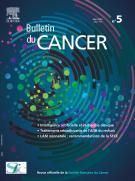Therapy-related myelodysplastic syndromes in the genomics era - 10/11/23
Syndromes myélodysplasiques liés à la thérapie à l’ère de la génomique

Summary |
Therapy-related myelodysplastic syndromes (t-MDS) represent a heterogeneous group of malignancies that arise as a late complication of prior exposure to chemotherapy and/or radiotherapy administered for a primary condition. T-MDS account for approximately 20% of all MDS and are characterized by resistance to current treatment strategies and poor prognosis. Our understanding of t-MDS pathogenesis has considerably improved over the last 5 years with the availability of deep sequencing technologies. T-MDS development is now considered as a multifactorial process resulting from complex interactions between an underlying germline genetic susceptibility, the stepwise acquisition of somatic mutations in hematopoietic stem cells, the clonal selection pressure exerted by cytotoxic therapies, and alterations of the bone marrow microenvironment. The survival of patients with t-MDS is generally poor. This can be explained by both patient-related factors including poor performance status and less tolerance to treatment and disease-related factors, such as the presence of chemoresistant clones, high-risk cytogenetic alterations and molecular features (e.g. high frequency of TP53 mutations). Around 50% of t-MDS patients are classified as high/very high risk based on IPSS-R or IPSS-M scores, versus 30% in de novo MDS. Long-term survival is only achieved in a minority of t-MDS patients who receive allogeneic stem cell transplantation, but the development of novel drugs may open new therapeutic opportunities, especially in unfit patients. Further investigations are needed to improve the identification of patients at higher risk of developing t-MDS and determine whether primary disease treatment can be modified to prevent the occurrence of t-MDS.
Le texte complet de cet article est disponible en PDF.Keywords : Therapy-related myelodysplastic syndromes, Therapy-related myeloid neoplasms, Post-cytotoxic myeloid neoplasms, TP53, Clonal hematopoiesis
Plan
Vol 110 - N° 11
P. 1129-1140 - novembre 2023 Retour au numéroBienvenue sur EM-consulte, la référence des professionnels de santé.
L’accès au texte intégral de cet article nécessite un abonnement.
Déjà abonné à cette revue ?

